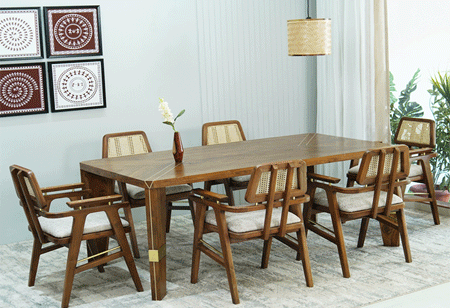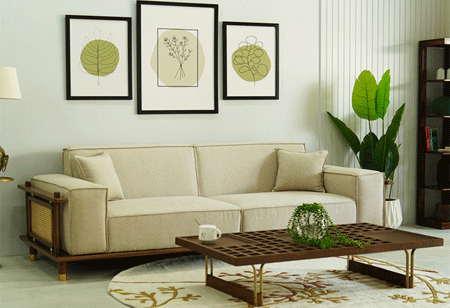
In conversation with Charulatha, Correspondent, Homes India Magazine. Naila expresses her thoughts regarding innovative design approaches for enhancing storage and practicality in smaller Indian residences, emphasizing the significance of custom furniture, traditional craftsmanship, and the role of regional diversity in the advancement and transformation of the Indian furniture industry.
Naila Khan, with a strong background in interiors, corporate communications, CSR, and furniture trends, she has broken barriers in the male-dominated furniture industry, promoting the role of women in design and business. She's an inspiring advocate for women's empowerment and growth.
The Influence of Environmental and Sustainability Factors on Design Trends in the Indian Furniture Industry
The Indian furniture industry has seen significant advancements, with a growing emphasis on sustainability. Specifically, in the solid wood sector, the use of materials from sustainable forests is a top priority to benefit the environment. Moreover, a noteworthy focus is on the adoption of non-toxic, non-VOC polishes, which contrasts with cheaper alternatives that some local artisans employ. The evolving industry trends also emphasize efficient production methods that minimize energy usage, reduce toxic materials, and prioritize design. In-house designers have played a vital role in identifying manufacturing processes that align with these principles. It's clear that consumers are now more conscious of their choices and the industry is moving in a direction that values environmental considerations.
Innovative Furniture Design Solutions for Maximizing Space and Functionality in Compact Indian Homes.
In the evolving market, a noteworthy gap existed – a lack of consideration for customization and the limitations of standard furniture. With the constant reduction in living spaces and a growing population, it has become crucial to address these challenges. Our approach focused on introducing multi-utility and space-saving furniture, catering to diverse needs. Every category on our website includes products that exemplify this concept. For instance, consider a small dining area unable to accommodate a six-seater table. Here, a convertible four-seater is an ideal solution, maximizing utility.
The essence of our designs lies in the optimization of hidden storage spaces and the integration of multi-utility features. These innovations are indispensable in today's market, addressing the pressing need for space-efficient solutions. Indian households grappling with limited space find solace in our multi-utility and space-saving furniture. Beyond dining solutions, our range extends to the living room with convertible sofa-cum-beds, serving as a seamless transition from day to night. In summary, these designs provide practical answers to the spatial challenges faced by households, offering versatile, adaptable furniture for the modern age.
Evolving Trends in Space-Saving and Custom Furniture Demand in the Indian Market
In recent years, there has been a significant rise in the demand for personalized, unique furniture in people's homes. While mass-produced furniture remains available, many individuals, especially those with permanent homes, increasingly prefer customized, emotionally resonant options. Despite initial challenges in the furniture industry in 2015, the desire for tailored pieces has steadily grown. Urbanization and limited living spaces have further fueled the need for customized furniture, driven by personal choices and tastes. This trend, especially prominent in the Indian market, continues to gain momentum, with numerous industry players embracing customization and experiencing substantial growth.
 The Significance of Traditional Craftsmanship and Regional Diversity in India's Furniture Industry Growth.
The Significance of Traditional Craftsmanship and Regional Diversity in India's Furniture Industry Growth.
India's diverse regions each have their unique furniture styles, contributing to the country's rich furniture industry. For example, Rajasthan is known for crafting sturdy wooden furniture, while Kerala specializes in teak wood pieces. This collaborative effort in materials and skills results in the creation of exceptional, one-of-a-kind furniture. Internationally, India's furniture has earned a distinctive reputation, especially in the UK and US markets, where its uniqueness is highly valued.
In India, there is a strong preference for locally made furniture, preserving the rich heritage and craftsmanship. This commitment to tradition not only maintains our cultural legacy but also leads to the development of exclusive designs. Architects and interior designers further enhance these designs by incorporating modern innovations and contemporary elements, blending the old with the new.
Influence of Changing Consumer Preferences on Indian Furniture Industry Strategies and Products.
In the past, custom-made furniture by local carpenters, known as the "brick-and-mortar" model, was favored for its affordability but raised concerns about quality and design. However, consumer preferences have evolved. People now prioritize quality and aesthetics, leading to a significant shift towards online shopping in the Indian furniture industry. To bridge the gap between online shopping and the need for physical assessment, retail stores have emerged, offering customers the opportunity to experience products in person before making online purchases. The convenience of online shopping, especially during the COVID-19 pandemic, reflects changing lifestyles, making it a practical option, especially in busy urban areas.
 Challenges and Opportunities for Indian Furniture Manufacturers in the Global Market
Challenges and Opportunities for Indian Furniture Manufacturers in the Global Market
In the global furniture industry, we face significant competition, particularly from China, known for its low-cost manufacturing. This price disparity poses challenges for us, as we strive to remain competitive. Chinese products often come at a lower price point, appealing to consumers, even if they differ in material quality. Additionally, the international perception of Indian furniture manufacturing has sometimes been associated with lower quality. As we expand into markets like the UK and US, this perception can be a hurdle.
Moreover, our traditional design focus, while preserving our heritage, can make it challenging to keep up with rapidly changing international design trends. Despite these challenges, the rise of online sales and export exhibitions in recent years has allowed us to showcase unique Indian furniture to the world, changing perceptions and increasing global acceptance. To remain competitive, we continuously work on improving our cost-effectiveness in production.
Conclusion: When choosing furniture, treat it as a long-term investment. Take your time, visit stores, and feel the pieces. Don't compromise quality for a lower price; cheap options may not last. Your furniture is a statement of your home and personality, so choose wisely with input from family and friends.
We use cookies to ensure you get the best experience on our website. Read more...
Copyright © 2026 HomesIndiaMagazine. All Rights Reserved.